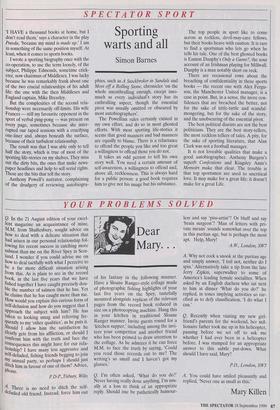SPECTATOR SPORT
`I HAVE a thousand books at home, but I don't read them,' says a character in the play Pravda, 'because my mind is made up.' I am in something of the same position myself. At least, when it comes to sports books.
I wrote a sporting biography once with the co-operation, to use the term loosely, of the subject, Philippe Edmonds, sometime crick- eter, now chairman of Middlesex. I was lucky because he was remarkably frank about one of the two crucial relationships of his adult life: the one with the then Middlesex and England captain, Mike Brearley.
But the complexities of the second rela- tionship were necessarily off-limits. His wife Frances — still my favourite opponent in the sport of verbal ping-pong — was present on every page, sometimes because she inter- rupted our taped sessions with a crucifying one-liner and, always beneath the surface, because of their turbulent relationship.
The result was that I was able only to tell half the story, which is true of most of the sporting life-stories on my shelves. They miss out the dirty bits, the ones that make news- paper headlines and help to sell serial rights. These are the bits that tell the story.
Anthony Powell's narrator, complaining of the drudgery of reviewing autobiogra-
Sporting warts and all
Simon Barnes
phies, such as A Stockbroker m Sandals and Moss off a Rolling Stone, chronicles 'on the whole unenthralling enough, except inso- much as every individual's story has its enthralling aspect, though the essential pivot was usually omitted or obscured by most autobiographers'.
The Powellian rules certainly existed in my own effort, and do so in most ghosted efforts. With most sporting life-stories it seems that good manners and bad manners are equally to blame. There is a reluctance to offend the people you like and too great a willingness to offend those you do not.
It takes an odd person to tell his own story well. You need a certain amount of self-awareness, a willingness to offend and, above all, recklessness. This is always hard for a public person: a good book requires him to give not his image but his substance. The top people in sport like to come across as reckless, devil-may-care fellows, but their books heave with caution. It is rare to find a sportsman who lets go when he tells his tale. One of the best ghosted books is Eamon Dunphy's Only a Game?, the sour account of an Irishman playing for Millwall. Dunphy is a man notably short on reek.
There are occasional rows about the breaching of confidentiality in these sports books — the recent one with Alex Fergu- son, the Manchester United manager, is a case in point. But, in a sense, the more con- fidences that are breached the better, not for the sake of tittle-tattle and scandal- mongering, but for the sake of the story, and the unobscuring of the essential pivot.
The best political diarists are not the best politicians. They are the best story-tellers, the most reckless tellers of tales. A pity, for the sake of sporting literature, that Alan Clark was not a football manager.
It is not loveable qualities that make a good autobiographer. Anthony Burgess's superb Confessions and Kingsley Amis's Memoirs make that clear. The trouble is that top sportsmen are used to uncritical love. It may make for a great life: it doesn't make for a great Life.


























































































 Previous page
Previous page